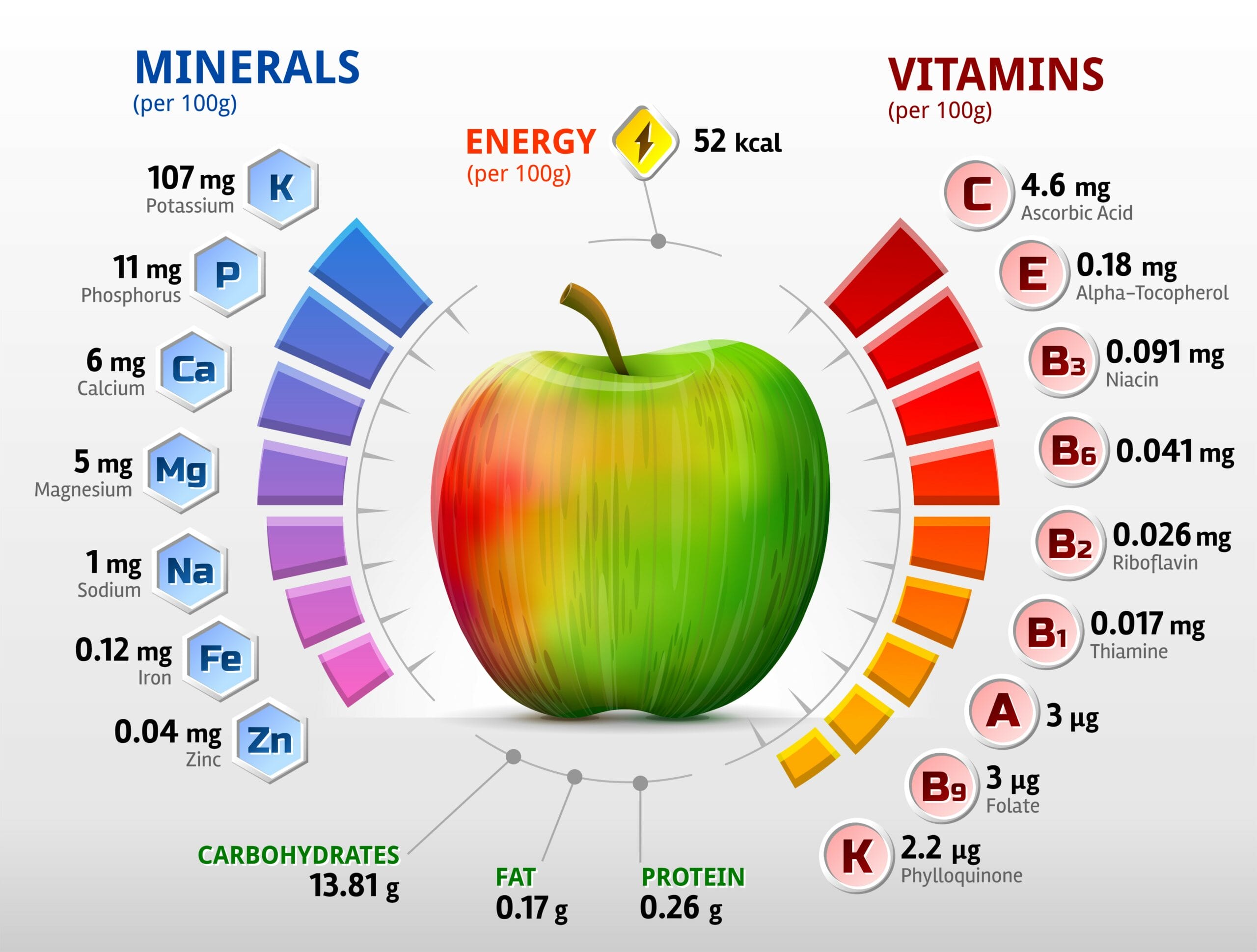There are many micronutrients found in foods that we eat daily; these vitamins and minerals are essential for our body to functions effectively in our daily lives. The importance of these nutrients is why eating a diet of variety is necessary, meaning healthy foods of different colors and food groups. Each nutrient is found in a few specific foods; it helps to know which foods to get the nutrients we need.
As a general rule vitamins and minerals are essential for our bodily functions. They help with cellular repair, immune health, wound healing, bone health, and producing energy. If we don’t get certain nutrients, it can lead to health complications and even birth defects.
It is helpful to know the functions of the different vitamins and minerals within our bodies, giving us more understanding of why we need them and how they are used. There are specific groups of vitamins and minerals based on their unique characteristics.
Why Do We Need Vitamins And Minerals?
All vitamins and minerals are crucial for our bodies, some more important than others. If we eat a variety of food from all the food groups, namely proteins, carbohydrates, fats, vitamins, and minerals, we will receive the nutrients we need. There are about 30 vitamins, minerals, and other dietary components that our bodies need to function.
Minerals and vitamins are necessary for our bodies to function optimally. A diet of variety, including many foods from different food groups, is essential to get all nutrients needed. It is imporant to cook your food correctly to make sure none of the nutrients are lost.
For our bodies to function effectively, we need the raw materials found in these foods. We digest the food we consume and absorb all the necessary nutrients into our bloodstream, which are then carried to the different parts of our body to be used. They all play hundreds of different roles in our body, for example, energy production, bone health, our immune system, repairing cellular damage, and so much more.
Vitamins and minerals, also known as micronutrients and are both different from one another. Vitamins are organic molecules and highly sensitive to heat, acid, and air. Minerals are inorganic and can hold their chemical structure well. Meaning minerals are readily available and can be absorbed into your body easily without being destroyed or lost.
Not including foods necessary for specific vitamins and minerals in your diet can cause harm; the severity depends on the nutrient. Some complications include anemia, scurvy, rickets, congenital disabilities, and even blindness. It is helpful to know the different side effects because if you notice something wrong, you are able to pinpoint if it is a nutrient deficiency.
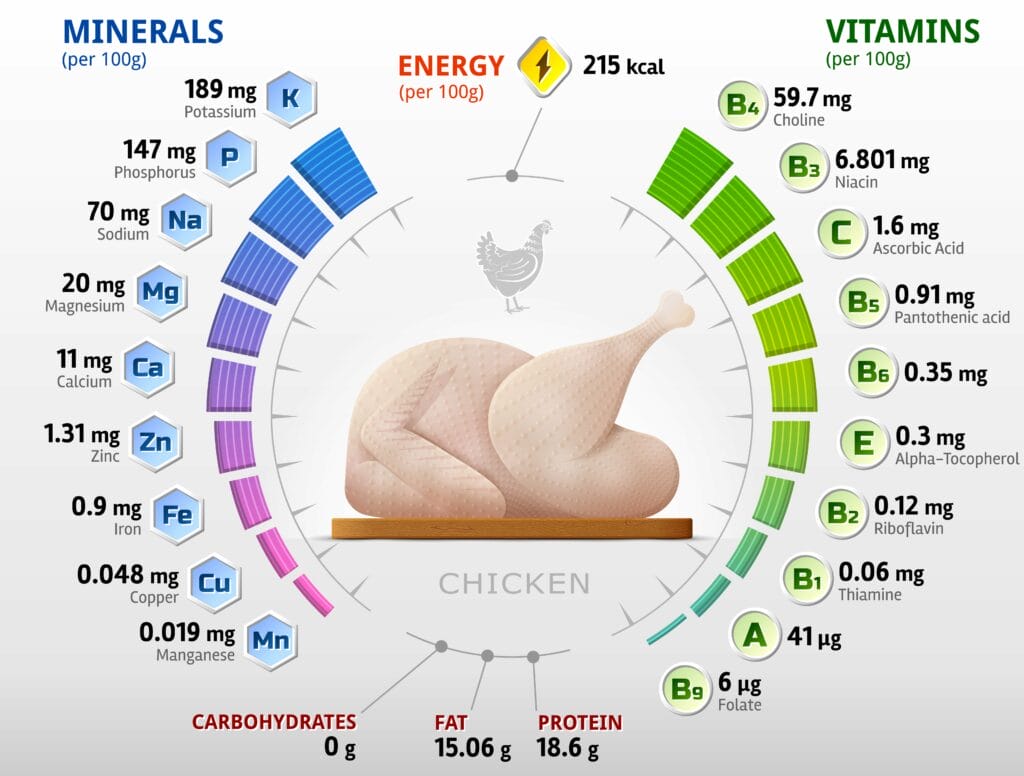
What Are The Necessary Vitamins?
Vitamins are more sensitive; they can be lost easier when stored, cooked, or exposed to the environment. There are different groups of vitamins, namely water-soluble and fat-soluble vitamins. Water-soluble ones include vitamin C and all your B vitamins, and fat-soluble vitamins include vitamin K, E, D, and A.
Water and fat-soluble vitamins have different functions. All B-vitamins ‘ primary function is the production of energy. They also help with hormone production, immune system support, cellular repair, etc. Fat-soluble vitamins are vital for antioxidant effects, eye, bone, and blood health.
Water-soluble vitamins are often easily absorbed and go straight into your bloodstream. However, there are some that need specific carrier proteins such as vitamin B12. They can move and circulate your body efficiently, going to the different organs that need them. Your kidneys regulate the level of vitamins within your body; if they are in excess, they will flush some out through the filtration mechanism in your kidneys and into your urine.
Water-soluble vitamins’ primary functions are building proteins and cells, making collagen, and improving your immune function. B vitamins’ primary function is to break down carbohydrates, fats, and proteins to produce energy for everyday activities. Some water-soluble vitamins can last a few days to a few weeks, depending on the vitamin; generally, it is best to replenish them every few days.
Fat-soluble vitamins are found in fats in foods and are not absorbed as easily as water-soluble ones; because they need to be escorted. Fat-soluble vitamins are absorbed through your intestinal wall by specific protein carriers.
These vitamins’ primary functions are building bones, improving vision, improving other vitamins’ absorption, and boosting our immune system. Fat-soluble vitamins are stored in your body’s fat and so stay inside your body much longer than water-soluble ones and can be replenished every few weeks or months.
When cooking your food, keep as many nutrients as possible by not cooking them at extremely high temperatures. Cook them by steaming or baking them in the oven and if you boil them, then as they will dissolve in the water ideally you would use the water to make gravy or some other aspect of hte meal.
Let’s look at the different vitamins and minerals found in vitamin supplements-
Water Soluble Vitamins
Vitamin B
“Vitamin B” is really a collection of several vitamins some of which are a collection of various compounds.
Thiamine (Vitamin B1)
Thiamine is used in the production of energy from our food. It is therefore a very important key vitatmin. It necessary for the adequate functioning of all the tissues in our body but the principal tissues that suffer from a lack of thiamines are the brain and peripheral nervous system, and heart.
[It is required to transfer electrolytes in and out of your muscles and nerve cells to help with recovery.
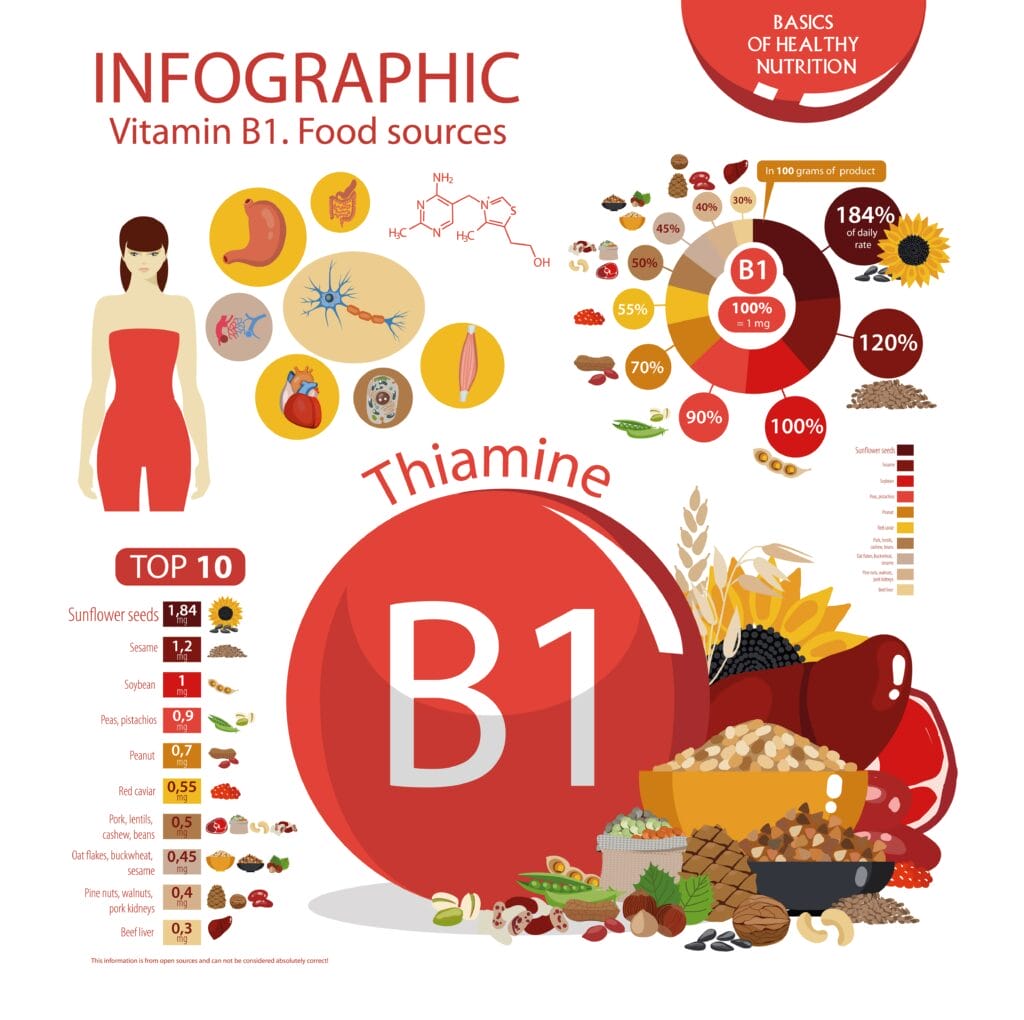
Yeast and liver contain the highest amount of thiamine; yeast is used for baked goods like bread. Other food sources include cereals, grains, meats, nuts, and fortified foods. The recommended daily amount needed is 1.0mg for males and 0.9mg for females.
People who may be at risk of thiamine deficiencies include those with alcoholism
[pregnant women, people who have had stomach surgeries, cancer patients, alcoholism, and HIV patients.
The effects of thiamine deficiency include anorexia, mental problems like short-term memory loss and confusion, leading to severe brain damage “Wernicke’s Encephalopathy”. The heart problems included heart failure (wet “Beri Beri”) and arrhythmias. The peripheral nerves can be affected causing tingling and numbness in the hands and feet.
Riboflavin (Vitamin B2)
Vitamin B2, also known as riboflavin, allows oxygen to be used by the body; it improves eye health, skin health, gut health, and blood cell production. Riboflavin also helps with the use of other vitamins, mainly vitamin B6 and B9, and it may play a role in preventing cancers.
Foods high in riboflavin include eggs, nuts, dairy products, meats, yeast, and soybeans. There are also high amounts in some grains and vegetables, mainly broccoli, Brussels sprouts, mushrooms, white rice, and wheat germ. The recommended daily intake for women is 0.9mg, and for men is 1mg.
If someone has a deficiency, they will have symptoms of a sore, inflamed mouth and lips and a red, swollen tongue. Other symptoms include anemia, damaged nerves, eye conditions such as inflamed conjunctiva, ulcers, and visual sensitivity.
Niacin (Vitamin B3)
Niacin is needed to make hormones in the adrenal gland and to remove toxins and chemicals in the liver. Rich sources of niacin are meat, fish, yeast, dairy products, eggs, nuts, and beans. This vitamin is also found in green vegetables and enriched bread and cereals. The amount of niacin recommended daily is 11mg for females and 12mg for males.
The main symptom of niacin deficiency is pellagra which is where your skin becomes pigmented and forms lesions. You can get other conditions such as a sore tongue, dermatitis, which is a skin condition, dementia, diarrhea, and tremors.
Pantothenic Acid (Vitamin B5)
Vitamin B5 is not well known as deficiencies are rare, but it is essential in our diets. This vitamin helps make coenzyme A, essential for aerobic respiration that is releasing the energy from glucose in the most efficient way. It is also involved in making making acyl carrrier protein with together with coenzyme A is involved in making fatty acids. It is because this mechanism of aerobic metabolism is so universal everything that we eat uses contains coenzyme A which in turn contains Vitamin B5, so defficiency is not a problem.
Vitamin B5 is essential for other body functions, such as producing hormones, and forming red blood cells. This vitamin also helps with the absorption and use of vitamin B2.
High food sources of vitamin B5 in animal products include eggs, kidneys, liver, skim milk, and salmon. Plant-based foods containing this vitamin include yeast, avocado, broccoli, and sweet potato.
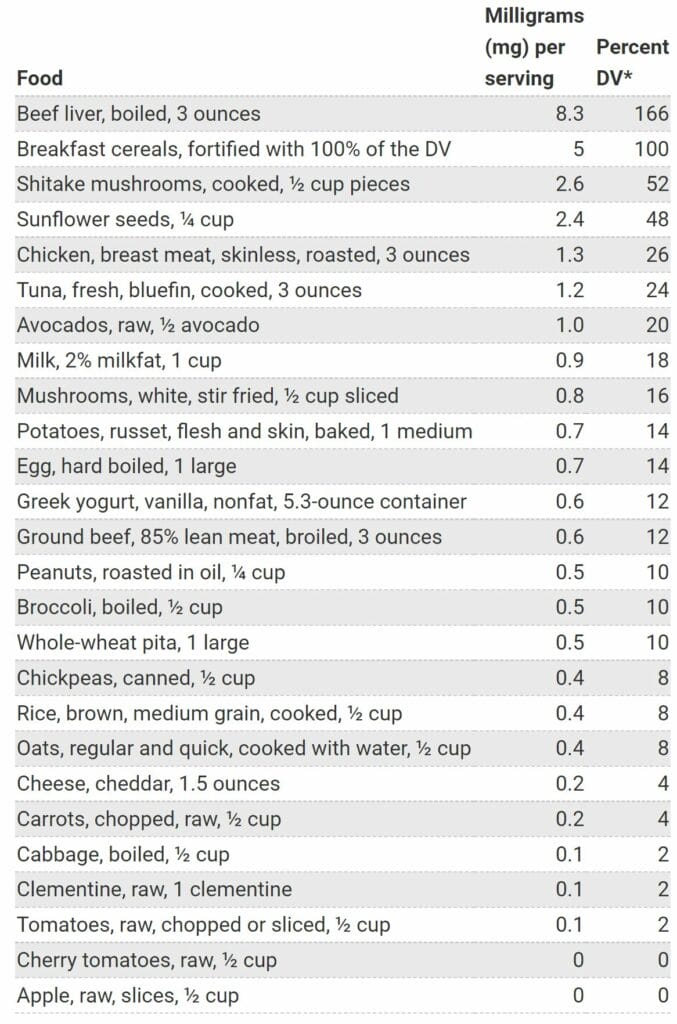
Small amounts of vitamin B5 are found in many foods, which is why a deficiency is rare; the daily recommended intake for this vitamin is 5mg for men and women. A vitamin B5 deficiency can lead to malnutrition, severe fatigue, depression, and weakness. It can also damage peripheral nerves causing paresthesia which is a tingling sensation in your feet and burning of your feet.
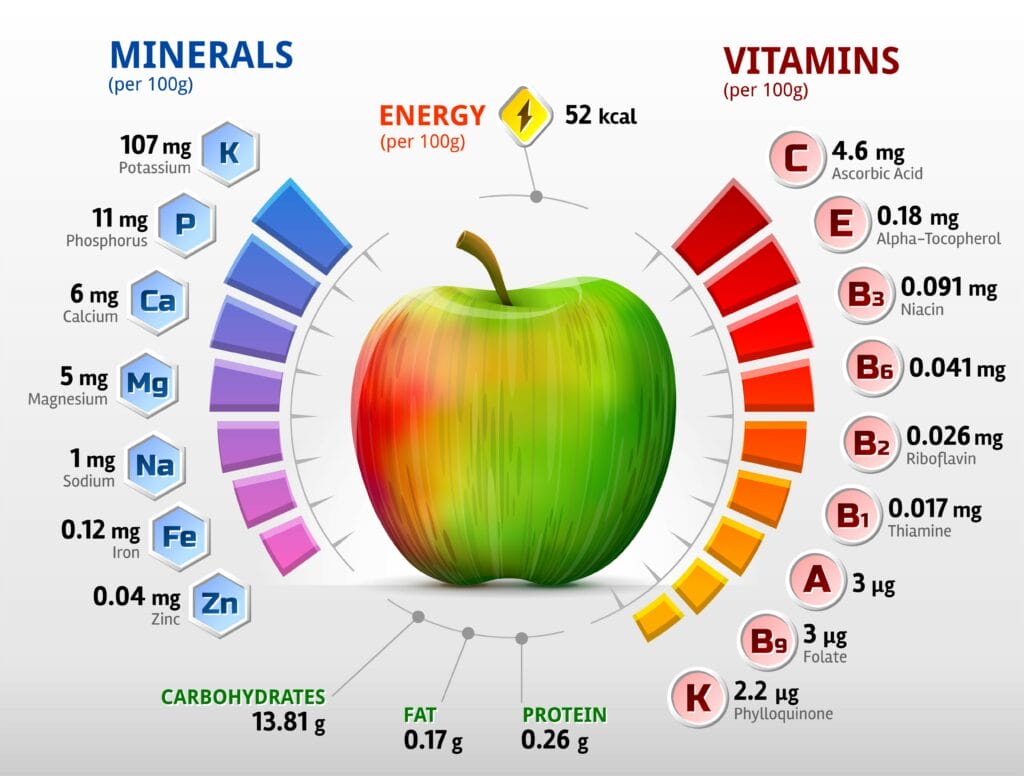
Pyridoxine (Vitamin B6)
Vitamin B6 is actually a collection of 6 different compounds each with B6 activity. It performs a vital role in over 100 enzyme reactions in your body, which are needed to break down and build specific molecules.
Pyridoxine is essential for the nervous system, and it helps produce neurotransmitters that are necessary for sending signals through your nerves. Vitamin B6 also helps with proper cell function, keeping cells healthy and forming blood cells. It is responsible for keeping homocysteine levels normal, homocysteine has been linked to heart attacks and strokes. In addition it has a role in promoting glucose formation and release from the liver.
This vitamin is also needed for brain development, immune system function, and hemoglobin production, which transports oxygen throughout your body, and it helps make niacin, vitamin B3.
Rich food sources of vitamin B6 include liver, beef, chicken, tuna, chickpeas, whole grains, potatoes, bananas, and nuts. The recommended daily requirement of pyridoxine increases with age but is about 1.5mg for both men and women.
Vitamin B6 deficiencies are commonly related to deficiencies in Vitamin B12 and B9. Symptoms include anemia, an inflamed tongue, cracked lips, skin conditions, depression, tingling and numbness of feet and hands, and weakening of your immune system.
Biotin (Vitamin B7)
Biotin, also known as Vitamin B7, is essential for healthy skin, hair, and nails. It plays a role in enzyme functions, specifically carboxylase, which is needed to produce glucose and fatty acids. This vitamin also helps with our blood sugar control, specifically in diabetic patients, and it is also necessary during pregnancy and lactation. In addition it is involve in the expression of genes and cell to cell signaling.
High sources of biotin include milk, liver, egg yolk, seeds, nuts, and some vegetables. The amount we should be getting through our diet every day is 30mcg in both men and women.
Biotin deficiencies are very rare; symptoms may be weak nails, hair, and skin conditions.
Folate (Vitamin B9)
Folate is an essential vitamin needed to produce DNA, RNA, and red and white blood cells in the bone marrow and maintain your heart’s health. Folic acid is crucial during pregnancy as it helps make nucleic acids, which are needed to prevent a severe birth defect known as neural tube defects.
Rich sources of folic acid include liver, green leafy vegatables, white rice, legumes and eggs. The FDA in 1998 mandated the addition of folic acid to various cereal based products. So we now have fortified cereal and bread.
The recommended daily amount needed is 400mcg for men and women, and if an inadequate amount is consumed, it can lead to a deficiency causing depression, seizures, and anemia.
Cobalamin (Vitamin B12)
Cobalamin, which is more commonly known as vitamin B12, is needed to improve and maintain brain function, red blood cell production, and nerve tissue health. It also helps with the absorption of folic acid into the blood.
Rich food sources include various meats, eggs, dairy products, yeast products, and fortified products such as cereals and soya milk. The recommended daily requirement is 2.4mcg for adults over 14 years.
A deficiency in vitamin B12 is more common than the other B vitamins; about 1.5 to 15% of the US population currently have it. A deficiency in vitamin B12 can lead to irreversible neurological complications and anemia.
| Food | Micrograms per serving | Percentage Daily Value |
|---|---|---|
| Beef liver, cooked, pan-fried, 3 ounces | 70.7 | 2,944 |
| Clams (without shells), cooked, 3 ounces | 17 | 708 |
| Tuna, bluefin, cooked, dry heat, 3 ounces | 9.3 | 386 |
| Nutritional yeast, fortified, from several brands (check label), about ¼ cup | 8.3-24 | 346-1,000 |
| Salmon, Atlantic, cooked, 3 ounces | 2,6 | 108 |
| Beef, ground, 85% lean meat/15% fat, pan-browned, 3 ounces | 2.4 | 100 |
| Milk, 2% milkfat, 1 cup | 1.3 | 54 |
| Yogurt, plain, fat free, 6-ounce container | 1.0 | 43 |
| Breakfast cereals, fortified with 25% of the DV for vitamin B12, 1 serving | 0.6 | 25 |
| Cheese, cheddar, 1½ ounces | 0.5 | 19 |
| Egg, whole, cooked, 1 large | 0.5 | 19 |
| Turkey, breast meat, roasted, 3 ounces | 0.3 | 14 |
| Banana, 1 medium | 0.0 | 0 |
| Strawberries, raw, halved, 1/2 cup | 0.0 | 0 |
Data from USDA FoodData central
In summary this table emphasises that Vitamin B12 comes from the following sources in order of amount-
- Sea Food
- Yeast
- Cattle products
- Poultry products
- No/very little vitamin B12 in plants
It is frequently seen in vegans and vegetarians due to their diet being low in animal products. To ensure they are consuming enough vitamin B12, they will need to take a vitamin supplement. It can also occur even if dietary intake is adequate if the production of a protein necessary for its absorbtion, “intrinsic factor” is impaired or intrinsic factor is neutralised by antibodies. Also in some conditions affecting the end of the small intestine absorption can be impaired.
Ascorbic Acid (Vitamin C)
Vitamin C, or ascorbic acid, is usually the go-to supplement when someone is sick as it helps boost their immune system. The functions of this vitamin include wound healing and the production of collagen and neurotransmitters. It helps with the absorption of iron. It also acts as an antioxidant that prevents the formation of oxidative radicals, causing cell damage. Oxidation of LDL (bad) cholesterol makes it more damaging to arteries, Vitamin C decreases this and increases good cholesterol. Despite this Vitamin C does not prevent cardiovascular disease, cancer or age related macular degenteration the most common cause of blindness in developed countries.
Good food sources are bell peppers, parsley, collard leaves, broccoli, brussel sprouts and cauliflower.
Unlike many animals we cannot make it and so it is an essential part of our diet.
High sources of vitamin C include fruits, vegetables, and organ meats. The daily amount we should have is 90mg for men, 75mg for women, and if you smoke, you will need more vitamin C.
A well-known deficiency of vitamin C is Scurvy; the symptoms include bleeding gums, loose teeth, depression, weakness, and wounds that don’t heal properly.
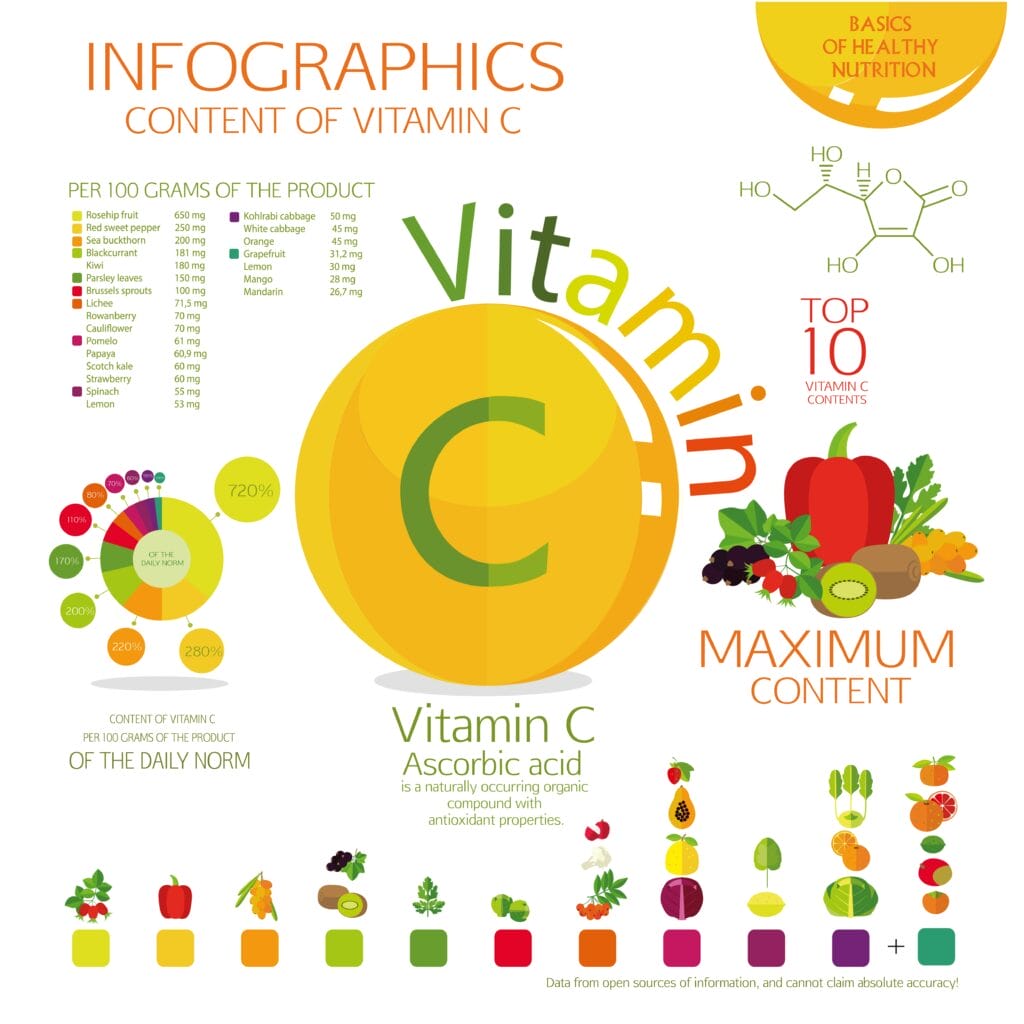
Fat Soluble Vitamins
Vitamin A
Vitamin A comprises two classes of compounds retinoids from animals and carotenoids from plants. Some carotenoids need converting to Vitamin A.
Vitamin A is well known for improving eyesight; this is where the saying “eating your carrots helps you see in the dark” comes from. It protects the retina from oxidative stress. This fat-soluble vitamin helps with cell function and growth, acts as an antioxidant, and helps with gene regulation. It is suitable for promoting healthy bones, skin, and hair, improving immune function, and is vital for reproduction as it helps with sperm production and fertilization. It reduces the risk of some cancers.
Rich vitamin A sources include organ meats, specifically liver, fatty fish, milk, cheese, and eggs. Plant-based sources include yellow, red, orange, and dark green vegetables and fruit. The daily requirement of vitamin A is 900mcg for men and 700mcg for women. Supplement dose is 5000-10,000 IU but smokes should be careful about Vitamin A supplementation as doses greater than 8000 IU have been linked to an increased incidence of lung cancer.
A supplement should have alpha-carotene 1 to 2 mg/day, beta-carotene 3-6mg/day and beta-cryptoxanthine 4mg/day.
Vitamin A deficiency can lead to fatigue, dry eyes, blindness, night blindness, anemia, skin conditions, and increase risk of infection.
Vitamin E
Vitamin E is a very important fat-soluble vitamin due to its antioxidant effects that are needed in our body. Antioxidants are essential because they prevent and reduce free radicals in our bodies which cause damage to cells that can lead to diseases like cancer. It is also valuable for protecting red blood cells to prevent anemia, improving eye health, boosting the immune system, preventing inflammation and heart health.
Food sources high in vitamin E include wheat germ, plant oils like sunflower oil, nuts, seeds, soybeans.
The recommended daily intake for adults is 15mg. Vitamin E deficiencies can result in neurological problems, specifically in the hands and feet, where one can lose body movement control and have muscle weakness.
Vitamin E is a blood thiner so if you should consult your healthcare provider before taking it.
Vitamin D
Vitamin D is a crucial vitamin that we get from the sun, as well as fortified foods. It is significant for bone health, protecting, and strengthening our bones. It is needed for calcium and phosphorus absorption, which are also required for bone health.
The daily recommended vitamin D intake is 15mcg; you can get this by spending at least 15-30 minutes in the midday sun. You obviously need to be careful to limit sun exposure however due to its association with skin cancer. VItamin D is found in oily fish such as sardines, salmon, tuna, shrimp, butter sunflower seeds, liver, eggs and fortified milk.
Deficiencies in vitamin D can lead to bone conditions such as rickets (soft bones) in children, osteoporosis, and osteomalacia. A severe defficiency can also lead to a decrease in calcium which can when severe cause muscle spasms, fits and even cardiac arrest.
More minor defficiencies can lead to delayed or absent menstrual periods.
However provided that we get a few minutes a day of sunlight a severe defficiency is very unlikely, although those living in more northerly or southerly regions the sunlight may not be strong enough during the winter to generate enough vitamin D.
Vitamin K
The role of vitamin K is necessary for blood clotting, which helps reduce excessive bleeding; it is needed for bone health and the regulation of enzyme functions.
Food sources are mainly green leafy vegetables, but also include vegetable oils, dairy products, meats, eggs, fruits, chickpeas, and cereals. Only about 25% is consumed in our food, the other 75% is produced by bacteria in our intestine.
The recommended intake per day is 90-120mcg for adults. A deficiency in this vitamin can lead to a defficiency of clotting proteins and excessive bleeding that can cause hemorrhages, anemia, and hemorrhagic diseases in infants. It can lead to less coronary calcification but it is unclear if this leads to a lower cardiovascular risk. A defficiency can also be a factor in oseoporosis.
In healthy people eating a good diet it is very very rare to develop vitamin K defficiency.
It is very important to realise that vitamin K supplementation can interact with some now seldom used anticoagulants like warfarin. So if you are on anticoagulants check with your doctor that it is safe for you to take vitamin K supplements before starting them.
What Are The Necessary Minerals?
Minerals are broken up into macro and micro; macro-minerals include calcium, phosphorus, magnesium, and sulfur and micro-minerals include iron, zinc, fluoride, and copper. Small micro-minerals known as trace elements include boron, chromium, cobalt, iodine, manganese, molybdenum, and selenium.
There are macro and micro minerals, both necessary for the body. These minerals have many essential functions, such as bone health, blood cell production, energy production, immunity, etc. It is necessary to include all minerals in your diet because deficiencies can lead to symptoms.
Minerals are absorbed and transported throughout your body in different ways. Macro-minerals’ primary functions are regulating water balance, improving bone health, and stabilizing protein structures throughout our body.
Micro-minerals and trace minerals are as essential as macro-minerals. Their main functions are to transport oxygen, improve our blood’s health, and the production of enzymes to help with different processes taking place in our bodies.
Calcium
Calcium is a well-known mineral needed in our everyday lives; the primary function we are all aware of is its importance in bone health, to improve density and bone mass. It is also needed for cell membrane functions, nerve transition, heart muscle function, and blood clotting. Another interesting function is its role in obesity; it is involved in the absoption, storage and breakdown of fat. The data for a role in obesity is good in animal models but in humans there is not enough data to be sure of the role of calcium in treating obesity.
Rich food sources of calcium are dairy products such as milk, yogurt, and cheese. Other foods include molasses, clams, oysters, dark green leafy vegetables, and fortified foods. The recommended daily intake is 1000mg for adults; this amounts to about four glasses of milk.
Vegetarians may absorb less calcium because of the consumption of plants with high levels of oxalic and phytitic acids which combine with calcium and make if more difficult to absorb.
Deficiencies in calcium can lead to osteoporosis, osteomalacia, and chronic diseases such as hypertension. Any benefit of supplementation on colon cancer is still uncertain and 1500mg or more may be linked to prostate cancer.
Phosphorus
Phosphorus is needed for bone health, muscle recovery, the activation of enzymes, and DNA, RNA, energy, and fat production. It helps control some enzymes action. Food sources of phosphate include meat, chicken, fish, eggs, and dairy products. Plant-based foods include yeast,wheat, nuts, beans, cereals, and fortified foods.
The daily recommendation is 700mg for adults. Phosphorus deficiencies are rare, but if someone has it, they will present with joint and bone pain, confusion, fatigue, loss of appetite, and electrolyte imbalances.
Magnesium
Magnesium is essential for producing energy and enzymes-it is used as a cofactor in over 300 enzymes. It helps with neuromuscular transmission and bone health. It can act as a natural tranquillizer and help induce sleep. Rich food sources of magnesium include seeds, nuts, cocoa, cereals and legumes. There is also a reasonable amount in soy milk, dark green leafy vegetables, and potato.
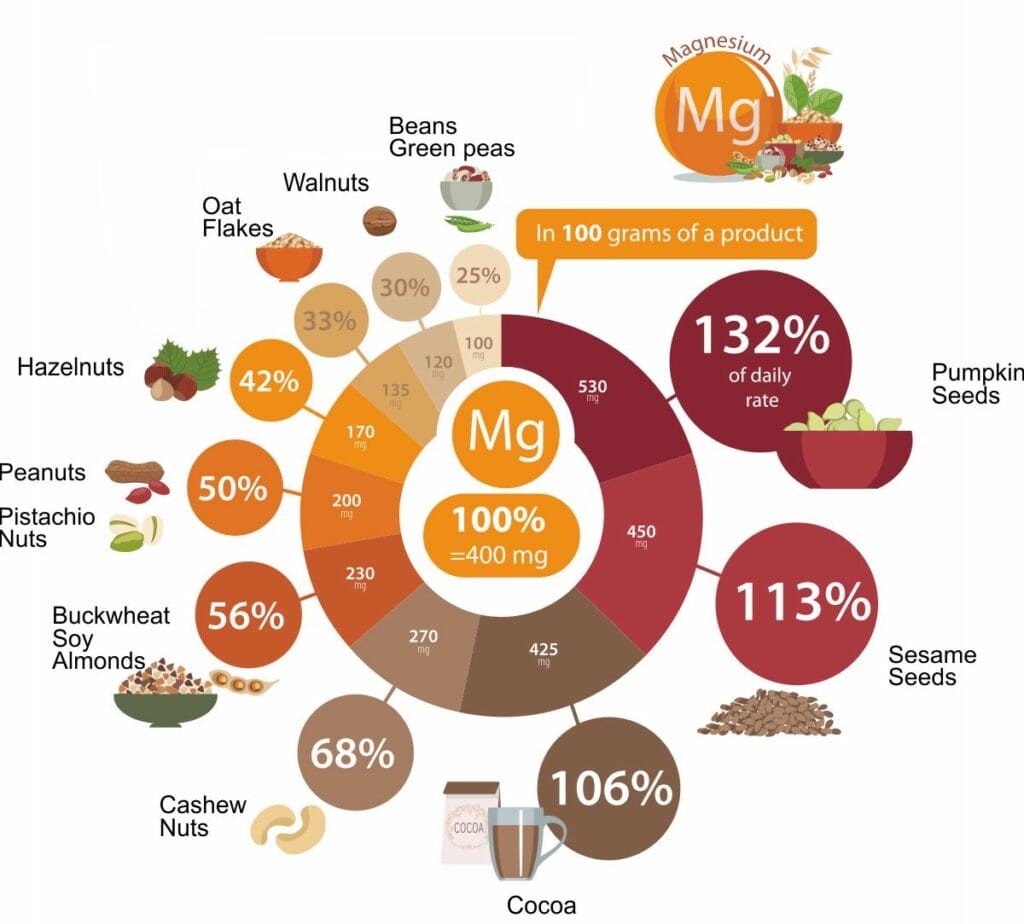
The daily requirement for adults is 310mg per day. Deficiencies of magnesium are rare, as it is used throughout the animal and plant kingdom and so is in much of our food. Symptoms may include anxiety, depresssion. insomnia, behaviour change, fatigue, tingling, muscle spasms, tremors, anorexia, nausea, insulin resistance, and increased risk for hypertension.
Sulfur
Sulfur plays a role in other essential molecules in the body; it is used to make three amino acids, namely cysteine, cysteine, and methionine. It is also a component of three B vitamins, thiamin, biotin, and pantothenic acid. Rich sources include meat, chicken, fish, eggs, beans, broccoli, and cauliflower.
Iron
Iron plays a critical role in the functioning of red blood cells, oxygen transport, enzyme production, immune function, and brain function. Food sources of iron include seafood, liver, fortified cereals, spinach, legumes, tomatoes, potatoes, and nuts.
The recommended allowance for adults is 8mg for men and 18mg for women. A deficiency in zinc can lead to iron deficiency anemia. Other symptoms of iron defficiency are fatigue, immune system impairment, growth abnormalities, and reduced muscle function. Fatigue, depression, decreased thinking ability, and hsir loss.
Zinc
The main functions of zinc include enzyme functioning, brain cell signaling, improving your immune system, genetic expression, and it forms part of protein structures. Food sources high in this mineral include meat, fish, chicken, dairy products, shellfish, and liver. Plant foods include nuts, beans, tofu, soy, cereals, and fortified foods.
The recommended intake is 8mg for women and 11mg for men per day.
Zinc deficiencies can cause reduced wound healing, increased hair loss, growth retardation, low immune function, and reduced taste. It also causes memory impariment, sleep disturbance, infertility, and hair loss. Zinc defficiency can also cause hypertension. Experimentally zinc supplementation has been shown to lower blood pressure.
Copper
Copper plays a role in many enzymes and is needed for energy production. It helps the formation of connective tissue including collagen and is necessary for the formation of blood cells. Food sources of copper include shellfish, meat, organ meats, chocolate, nuts, cereals, legumes, and dried fruits. The recommended intake of this mineral per day for adults is 900 ug.
A copper deficiency is rare in adults; it can cause anemia, skeletal deformities, and neutropenia which is a low white blood cell count. It can result in growth retardation, poor hair growth, hypothermia, and mental deterioration in infants.
Fluoride
Fluoride is put into our toothpaste because it is very good for our teeth and helps prevent dental caries. It is also found in fluorinated drinking water, foods, and drinks. Adding fluoride to toothpaste and water helps us get the recommended amounts.
Iodine
Iodine is an essential mineral; it is needed for the production of thyroid hormone. There are many deficiencies seen in rural areas and developing countries. Deficiency can cause reduced cognition in children. It can also cause depression, insomnia and it is also necessary for thyroid function. Dry eyes and fatique have been reported.
Food sources high in iodine are salt, seafood, beef, eggs and peanuts. Society has fortified salt with iodine to help reduce deficiencies as this is a widely used product. The recommended intake for adults is 150mcg per day.
Selenium
Selenium has a role in DNA repair and so helps prevent cancer and is necessary for a healthy immune system. It aids in the production of thyroid hormone. and specific enzymes. It performs as an antioxidant, getting rid of the free radicals that damage our cells. Food sources containing selenium include butter, herring, brazil nuts, wheat germ, and seafood.
The daily recommendation for adults is 55mcg; deficiency of selenium is very rare. If present defficiency causes hair loss, dry hair, fatigue and irritability.
Manganese
Manganese is a cofactor for a large number of enzymes, in energy production and protein breakdown and synthesis. It is essential for a healthy nervous system. It is needed for a healthy immune system and the formation of connective and skeletal tissues, growth, and reproduction. It is also essential for the breakdown of proteins and fats, and it plays a role in the composition of enzymes. The daily requirement is 1.8 mg for adults per day, which you can get from whole grains, legumes, nuts, and tea.
Deficiencies are rare, but they can lead to inadequate reproductive capacity and pancreatic function. Symptoms that one may experience include nausea, vomiting, frail hair, decreased hair and nail growth, skin rashes, and weight loss.
Chromium
Chromium plays a vital role in glucose production, insulin activity, and gene expression. The daily requirement for adults is 25ug; this can be obtained from brewer’s yeast, beef, wheat, oysters and potatoes. Chromium deficiencies can cause insulin resistance which leads to high sugar levels in the blood. Anxiety, raised blood lipids and heart disease are also signs of defficiency.
Molybdenum
Molybdenum plays a role in specific enzyme reactions for –
- Energy production
- Alcohol detoxification
- Uric acid formation
Deficiencies are possible; symptoms that may present are mental disturbance, headache, visual probelms, rapid heart rate and fatality. The recommended dosage per day is 45ug for adults, obtained from legumes, whole grain cereals, milk products, and dark green leafy vegetables.
Boron
Boron increases the production of sex hormones, helps miantain memory and improve brain function, it encourages cartilage growth and increases bone mineral density. It is involved in the regulation of calcium, magnesium, copper and phosporous. It may reduce prostate cancer.
Foods rich in boron include nuts especially almonds and hazelnuts, dried apricots, raisins, and red kidney beans.
If defficient a person can experience decreased focus and memory, depression. hormonal imbalance, receding gumlines, arthritis and osteoporosis.
Conclusion
All vitamins and minerals fullfill different but essential functions. We cannot do without any of them. Fortunately they are also essential for plants and animals as well. So that provided we eat a balanced diet with fresh fruit and vegetables with 5 portions of fresh fruit and vegetables per day, and ideally some animal protein on 2-3 days per week then we are very unlikely to suffer a defficiency. For vegetarians supplements are necessary to avoid defficiencies.
Also it is unlikely for you to overdose from eating too many foods high in specific vitamins and minerals, but this can happen if you take too high a dose of a nutrient supplement. An overdose of a vitamin and or minerals can have significant side effects, some being very harmful. So care should be taken with supplement dose.
As you can see, vitamins and minerals are essential for our body to function optimally. They are needed for basic cellular functions that apply to all cells in our body, for instance when they are used to produce energy, repair and build cells. Defficiencies often affect our brain, immune sytem, blood, bone, and skin but can affect many more systems. Without them, we can become very sick, and our bodies and minds suffer.
This is why eating a variety of different foods is vital to ensure you get the nutrients you need.
References
New Advances about the Effect of Vitamins on Human Health: Vitamins Supplements and Nutritional Aspects–here
Role of Vitamins in Human Health and Nutrition: Sources and Morbidity–here
A Systematic Review on the Implication of Minerals in the Onset, Severity and Treatment of Periodontal Disease–here
The importance of mineral elements for humans, domestic animals and plants: A review-here
Riboflavin (vitamin B-2) and health–here
Vitamin B3–here
Vitamin B5 (Pantothenic Acid)–here
Vitamin B-6–here
Analysis of Biotin (Vitamin B7) and Folic Acid (Vitamin B9): A Focus on Immunosensor Development with Liposomal Amplification–here
Importance of folate in human nutrition–here
Vitamin B12 in Health and Disease–here
Vitamin C in Disease Prevention and Cure: An Overview–here
What is vitamin A and why do we need it?–here
Vitamin E–here
Vitamin D: The “sunshine” vitamin–here
The health benefits of vitamin K–here
Calcium Intake and Health–here
Assessing the Health Impact of Phosphorus in the Food Supply: Issues and Considerations–here
Magnesium and Human Health: Perspectives and Research Directions–here
Are we getting enough sulfur in our diet?–here
Review on iron and its importance for human health–here
Zinc and its importance for human health: An integrative review–here
Dietary copper and human health: Current evidence and unresolved issues–here
Fluoride: a review of use and effects on health–here
Research needs for assessing iodine intake, iodine status, and the effects of maternal iodine supplementation–here
Dietary Selenium and Human Health–here
Manganese in Health and Disease–here
Role of Chromium in Human Health and in Diabetes–here
Molybdenum–here
Nothing Boring About Boron–here
Cobalt: Its Role in Health and Disease–here
Vitamins and Minerals–here
Vitamin B2 (Riboflavin): Sources, Benefits and Dosage–here
What is thiamin, or vitamin B1?–here
Niacin (Vitamin B3): Benefits & Side Effects–here
What to know about vitamin B5–here
The benefits and food sources of vitamin B6–here
What are the health benefits of biotin?–here
Why is folate good for you?–here
Everything you need to know about vitamin B-12–here
Vitamin C: Why is it important?–here
Everything you need to know about vitamin A–here
Health benefits and sources of vitamin K–here
What are the health benefits of phosphorus?–here
Foods–here

